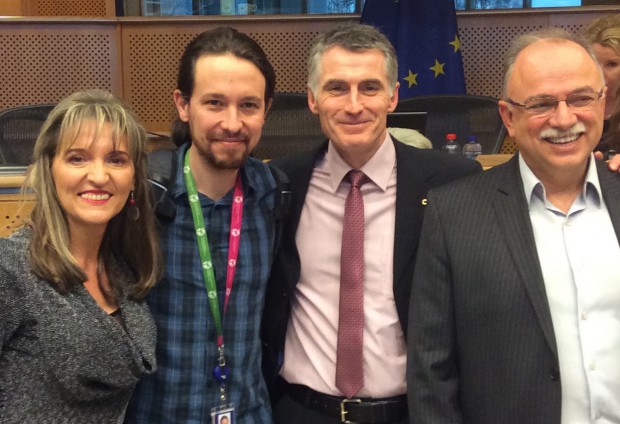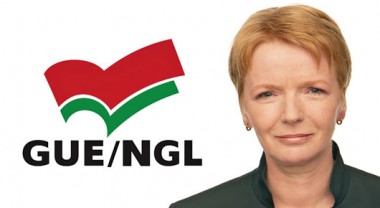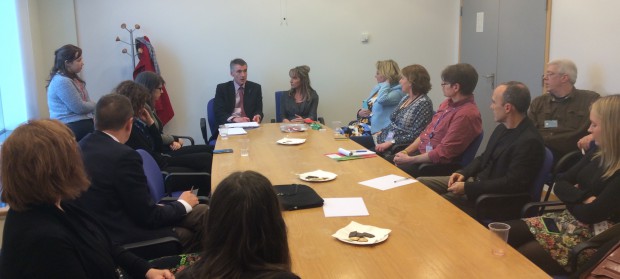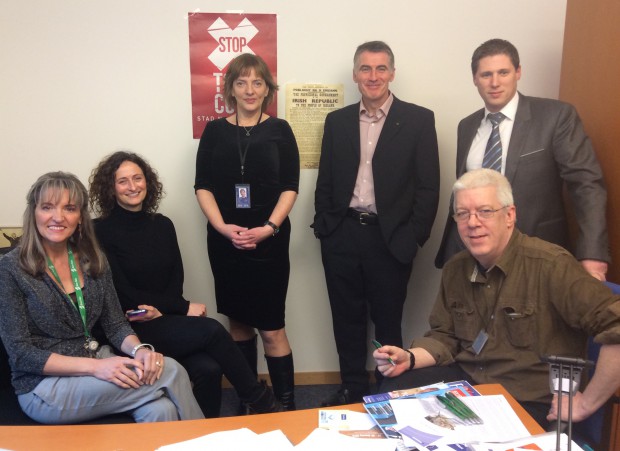5 February 2015
MEPs' support for Peace Process and implementing Stormont House Agreement

Sinn Féin MEP Martina Anderson with Podemos leader Pablo Iglesia Turrión MEP, Declan Kearney and SYRIZA MEP Dimitris Padimoulis at the European Parliament
THE European Parliament is a huge institution. It can be a brake upon or a catalyst for change. Its global centrality to politics, economics, culture and the environment, however, makes it an essential site of struggle for its vast diplomatic and political influence to be positively and progressively employed.
In December, the Parliament passed an unprecedented resolution on the Irish Peace Process as a result of constructive lobbying by Sinn Féin’s European team and a wide range of other concerned MEPs from all groups and across the political spectrum.
This demonstrated two things:
1) The continued level of support for the Irish Peace Process and reconciliation;
2) The Parliament’s willingness to use its considerable influence to be helpful to the peace and political processes.
During a two-day visit to the Parliament in Brussels last week, I emphasised that the Peace Process could not be taken for granted and acknowledged the importance of last December’s resolution encouraging the negotiations which led to the Stormont House Agreement (SHA).
The resolution pledged renewed political, economic and social support by the Parliament for the Peace Process. That included, in the event of a successful talks outcome, a commitment to invite both Martin McGuinness and Peter Robinson to jointly address the Parliament at the invitation of its President, Martin Schultz.
The European Union has an important role – alongside all political parties, and the US administration, and the British Labour Party – to ensure that the democratic process in the North now moves forward decisively on the basis of implementing the SHA and establishing real power-sharing.
The Peace Process itself must never again be subject to the negative mismanagement and disengagement which has been a hallmark of both the British and Irish governments’ strategy and policy over the last five years.
The two governments now need to measure up to their obligations – but that will not happen in the absence of political pressure and accountability.

Gabi Zimmer (pictured above), the GUE/NGL (European United Left/Nordic Green Left) Group President, and the GUE/NGL secretariat arranged for a detailed political analysis to be presented to the GUE/NGL Group MEPs, political advisers and staff meeting on political developments since the Stormont House Agreement was concluded.
A comprehensive plenary discussion ensued on the political and economic situation in Ireland, North and South. Very important contributions were made by Dimitrious Papadimoulis MEP, leader of the Syriza MEPs; Pablo Iglesias Turrión MEP, leader of Podemos; and Josu Juaristi, MEP, from EH Bildu (Basque Country); as well other MEPs from Portugal, Cyprus, Galicia, Finland and Germany, among many others.
As a result, GUE/NGL has agreed to strongly encourage all other groups in the Parliament to support bringing forward the December 2014 resolution. Importantly, the GUE/NGL Group confirmed that it would send a fact-finding delegation to the Ireland without delay to assess progress in the political process.
● Peace Process Inter Group meeting at the European Parliament
The same day, a meeting was held with the Peace Process Inter Group. It has agreed to draft a formal cross-group and party letter to President Schultz requesting him to immediately progress the commitments in the resolution. Its members will be engaging directly with the British Government and Irish Government representatives to the Parliament. They will also be actively exploring how a strategic focus can be sustained upon the Peace Process.
The assistance committed by both the GUE/NGL and Inter Group meetings will be crucial forms of international influence in the coming period. They will be key to the ongoing positive engagement of the EU.
Other meetings were also held with Basque representatives and the Palestinian Ambassador to the European Parliament, during which they described the latest political challenges being posed against achieving democratic political settlements in those countries.
There is a clear understanding among significant sections of opinion in the European Parliament that the peace and political processes in the North have just faced their greatest challenge in many years.
Whilst a road map for renewed political stability has been agreed, it is recognised there can be no complacency in moving forward.
The EU helped to guide the North away from conflict and instability; now it has a vital, strategic role in helping to open a new phase of the Peace Process based upon reconciliation.
The increased mandate of Sinn Féin in Europe (and evident credibility of and respect for the party’s team in Brussels) will be essential to maximising this important influence.
● The Sinn Féin team at the European Parliament
Follow us on Facebook
An Phoblacht on Twitter
Uncomfortable Conversations

An initiative for dialogue
for reconciliation
— — — — — — —
Contributions from key figures in the churches, academia and wider civic society as well as senior republican figures







